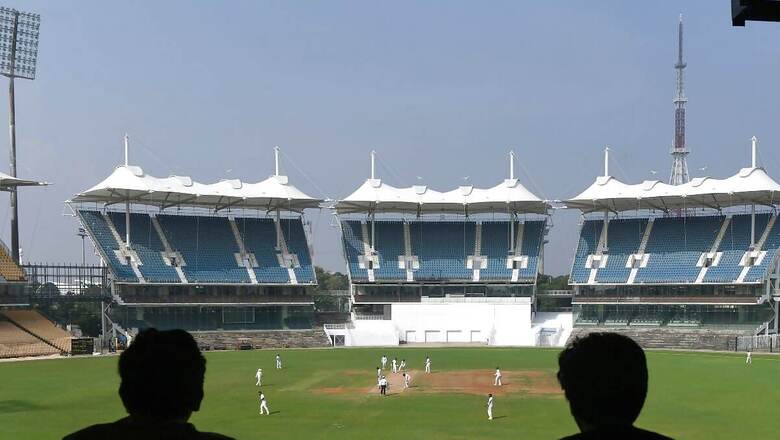
views
Talent scouting is one of the most underrated roles in cricket. Discovering an unearthed talent is largely analogical to planting a tree. The seeds are sown at the domestic level or age-group cricket. The scout acts as a gardener along with the coach at this stage, watering the plant (read player) and help the branches and leaves to slowly burst out.
Together, they look after the plant before it’s ready to embrace newer challenges.
The question that often rises is what makes a scout good? In more practical terms, what do the various teams – IPL, WPL or from any other T20 leagues – look at while appointing a scout.
The scouting industry continues to expand as more and more T20 leagues continue to crop up. It’s impossible for the coach/support staff to be present in every/any corner of the country/world to spot and unearth fresh talent. This is where a scout comes into play.
Watching age-group tournaments, tracking domestic T20 leagues, monitoring high-quality club-level tournaments and then injecting the promising players into their set-up where they undergo trials, match simulations and target-based net sessions to ascertain whether or not they are cut out for the big league.
Coaches or scouts associated with the franchises say that it is hard to define as each franchise will have their own process and requirements, and it largely depends on what kind of job description they roll out. A franchise like Delhi Capitals uses its academy as a feeder, Mumbai Indians have a very comprehensive set-up where even the likes of John Wright have been spotted watching local games and Royal Challengers Bangalore have a slightly different approach and recently ventured into ‘Hinterland Scouting’.
Different ways but the objective is the same – to find and groom players for the future.
Despite different approaches and ways, there are some standard checks that a prospective scout is required to tick. Observations, curiosity to understand personality of the player, network, understanding of the game, and a few more are some of the primary checks.
But can a young professional trying to make a space in cricketing circle become a scout?
“When you talk about young scouts and all that, ‘it depends’ is the word for all that. The scouts get respect because of the credibility and the experience which they bring in. Like any profession, for a youngster below 30, what is the starting point? Did he start scouting when he was 18, or when he was 23, 24? And in the next five-six years, what is it that he exactly brought in through his daily looking at players and experience?” says Monty Desai, who has been one of the best in the scouting business.
Desai, who now is Nepal’s head coach, was associated with Rajasthan Royals and Gujarat Lions as a scout earlier and boasts of several interesting discoveries during his tenure including Pravin Tambe and Shivil Kaushik for the Royals and Basil Thampi for the Gujarat Lions.
Nisarg Naik, who was associated with a few WPL franchises in the inaugural season in 2023, explains why youngsters should be brought into the setup.
“Young scouts can bring in a new perspective. Secondly, nurturing is important. For example, in corporate environment, there is an opportunity for a fresher. New comers work with the experienced employees and that is how the company works. As far as scouting is concerned, there are no such opportunities,” Naik tells CricketNext.
“If a young scout is selected, he will always be assigned to find a young player in the similar age group. The good thing here is that a young player will feel more comfortable with a scout who is similar in age. There are chances that they will develop a friendly bond. If the player is dealing with a senior scout at the same time, they will hesitate to share everything. It will also help the franchise since they can look at it as a long term investment,” he adds.
A former India cricketer and a coach with one of the WPL franchises said, “For scouting there is no age bar otherwise RCB wouldn’t have Vanitha VR last season (in 2023).”
Naik, who has also been a net bowler with an IPL franchise in the past, implied that it is not necessary to have played professional cricket at a certain level to get into scouting. “I know a scout who wasn’t a professional cricketer. He had played only the Kanga League. Even if someone has played state level cricket that should be sufficient,” he said.
Desai also concurred with this idea and gave his own example to confirm that being a professional cricketer is not necessary.
“Every aspiring cricketer wants to represent his state and play international cricket. But not everyone gets the opportunity. It doesn’t mean that he must have not played. Even though he has not played, if he understands the difference between a good player and a great player, that’s the starting point for becoming a scout.
“I am prime example of it. I have never played at highest level, I never represented state or Mumbai at any age group level. But probably understood the dynamics of the game,” says Desai.
Another interesting example would be AR Srikkanth who left his HR job at a software company to become a cricket analyst and scout with Kolkata Knight Riders.
While there have been multiple examples of scouts who were not professional cricketers, the IPL franchises still prefer to have those. Mumbai Indians’ scouting team is the prime example that includes the likes of Parthiv Patel.
“Mostly all other franchises scouts are professional cricketers, but again it’s not important,” the WPL coach said.
Desai says despite the data and analysis available in the modern day, scouting still has a room and explained the key ingredients that franchises or teams look at before hiring a someone.
“Observation is the important thing for a scout. And then obviously the curiosity that the scout brings around in understanding the character, history and life journey, personality, and what really drives the player. Once you have all those answers, you can suggest a player to the higher authorities.
“The data will come up, but the data will give you some idea. The filtration of the data through the interesting questions that you ask yourself and then you match that with your judgment.
“How successful you become as a scout comes down to many ingredients, and one of the simplest of all is the trial and error method. Because success is trial and error. You don’t have standard formulae when you start scouting,” Desai said.
Desai also highlighted the importance of understanding a team’s culture. While a player might be talented, but for him to fit into the team requirement and culture is equally important.
“It also comes down for the scout to understand the need of the team. Understanding if the player can fit the bill. And if the personality of the player can fit into the team culture. You can talk about winning, but what is the team culture you are looking at. The scout needs to bring in the experience around that too,” he said.
Naik has a similar outlook. “Networking is important, what kind of connections the candidate has. Another important aspect is to know what kind of players the franchisee requires, considering where the loophole is in the squad,” he said.
Naik also highlights that there is no professional curriculum to go through and qualify as a scout, while all other roles in cricket can be applied for with some level of qualification.
“There are exams for umpire, scorers. We have to study for it and appear for the exams. There are courses for strength and conditioning coach, physio, and data analyst as well. But, there is nothing to study, no course for scouting. How does one proceed in this field? If there are some courses that can help gain more knowledge, it will be very beneficial,” he said.
The WPL coach said, “As of now there is no course to develop scouts. There can be formal ways to hire but about course I’m not sure. The idea sounds interesting though.”
Desai was excited at the idea of having formal courses for scouting.
“It’s a thought provoking and interesting question. Maybe formulating a course like that might bring out lot of these examples from different scouts, wherein they can share their experience and the young aspiring scouts might get insights because of that. It can be a mix of scouts from different sporting sectors. I think this formal courses for scouts, maybe, it can help create good partnership between the scouts and development coaches,” he said.
Desai then explained why attending the games and making keen observation is a necessary skill.
“You can look at body language of a player. You might be looking at an X-factor in the fielding, if he is a live wire in the ground. He creates a chance of a run out, not necessarily a run out. With batsman, you might look at how excellent he is in running between the wickets, or the pockets which he is hitting. All these things require experience and cannot happen overnight.
“A youngster who is trying to become a scout and doing it first time, he will be naïve. You need a little bit of wisdom, you need some guidance which is given by someone experienced or coaches.
Naik echoes the views. “I think, a good scout will be the one who is frequently going to games, constantly watching the players playing on the field. That will help him know more about the player – his temperament, decision making.”
“No one considers youngsters in this role. But I feel having new comers work with experienced scouts will be a dynamic mix,” Naik said while pitching for aspiring scouts.




















Comments
0 comment